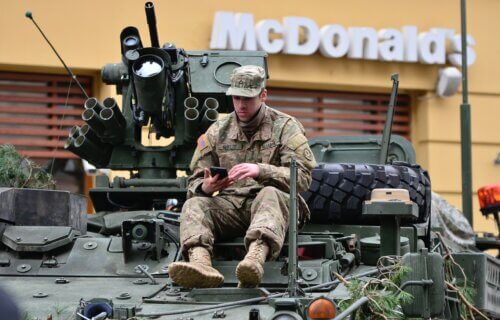
PHILADELPHIA — Obesity is now putting the world at risk — by threatening the readiness of the U.S. military, according to a team of nutritionists.
Researchers from the University of Kentucky College of Medicine say the rise in the number of overweight people limits numbers of available recruits for military service and affects mission-readiness.
“This is a complex problem that has a deep impact on national security by limiting the number of available recruits, decreasing re-enlistment candidacy, and potentially reducing mission readiness,” says lead author Dr. Sara Police in a media release.
“Additional, relevant issues include the changing demographics of the military and food insecurity among military families.”
Obesity is recognized as a public health crisis with serious medical and economic effects. The CDC estimates that nearly 42 percent of all American adults over 20 now classify as obese.
Modern Americans are unfit for duty?
A link between health and national security was first identified in 1946 after World War II. The National School Lunch Program targeted malnutrition. During the war, food rationing meant daily calories were limited. Today, the reverse is happening. Fat and sugar-laden products and increased portion sizes are readily available and it’s leading to bulging waistlines.
Since 1960, numbers of otherwise eligible men and women for enlistment have dropped, with those exceeding body fat percentage standards doubling and tripling, respectively. The crisis has prompted military leaders to call for changes in nutritional and dietary patterns.
These changes include initiatives in schools to remove less healthful food options and increase the use of free and reduced cost lunch programs. Nutrition education within the armed services is another solution.
“Drill sergeants are essential and important leaders in the armed forces for coaching, counseling, mentoring, and training new soldiers,” explains Dr. Police. “This Perspective draws on previous studies illustrating that accurate nutrition information and behavior modeling could strongly influence recruits.”
“Other leaders, including commanding officers and non-commissioned officers, also play essential roles in information dissemination and behavior modeling and could have a continued impact on soldiers beyond basic training,” adds co-author Nicole Ruppert.
Food insecurity in military is also an issue
The changing demographics of today’s basic training regiments include a greater percentage of women and those from racially and ethnically diverse backgrounds. However, researchers say these are groups who experience a higher rate of obesity and food insecurity. They explain that unreliable access to fresh fruit and vegetables can lead to both weight issues and mental health problems. This further threatens retaining recruits and getting them into shape for missions around the globe.
“Despite efforts by the US government and Department of Defense, obesity continues to impact the military, and the risk to national security is great,” Dr. Police concludes. “Research to uncover best practices will consider the increasing diversity within the armed forces, the importance of access to healthy food, and the opportunity to support nutrition education through informed leadership.”
The findings are published in the Journal of Nutrition Education and Behavior.
South West News Service writer Mark Waghorn contributed to this report.


fast food an sugar in everything
When you eat that much crow you’re bound to go muffin-top.